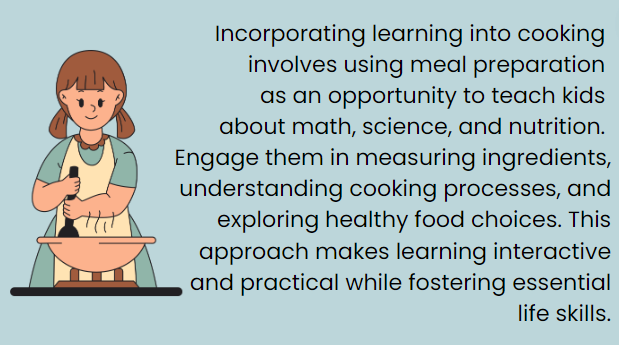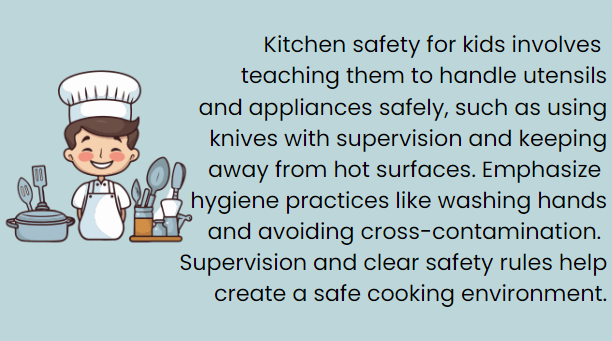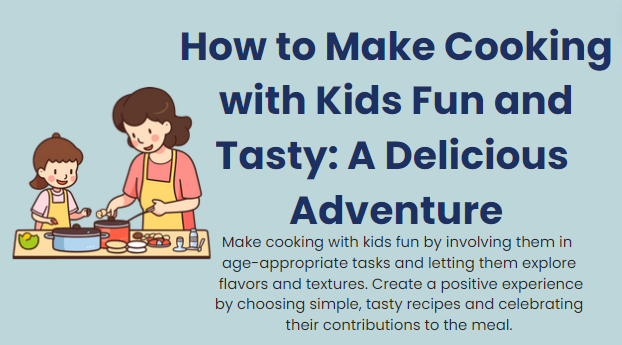Cooking with kids is not just about creating meals; it’s about building memories, teaching life skills, and fostering a love for healthy eating. This article will guide you through the process of making cooking with children both enjoyable and delicious, ensuring that your little chefs have a blast while learning valuable lessons in the kitchen.
Why Cook with Kids?
Before we dive into the how-to’s, let’s explore the benefits of cooking with children:
- Develops fine motor skills
- Encourages healthy eating habits
- Boosts self-confidence
- Teaches math and science concepts
- Promotes family bonding
- Introduces cultural awareness through food
Setting the Stage for Success
To ensure a positive cooking experience with kids, consider the following tips:
- Choose age-appropriate tasks: Assign duties based on the child’s age and skill level.
- Prioritize safety: Teach proper handling of kitchen tools and emphasize hygiene.
- Be patient: Expect messes and slower progress; the journey is as important as the destination.
- Make it fun: Incorporate games, songs, or themes into your cooking sessions.
| Age Group | Appropriate Tasks |
|---|---|
| 2-3 years | Stirring, pouring pre-measured ingredients |
| 4-5 years | Mashing, kneading, simple cutting with supervision |
| 6-8 years | Measuring ingredients, cracking eggs |
| 9+ years | Following simple recipes, using small appliances |
See also>> Packing Light: What to Bring for Any Trip
Fun Cooking Activities for Kids
- Create a mini pizza party: Let kids choose their own toppings and arrange them on personal-sized pizzas.
- Fruit and veggie art: Use various fruits and vegetables to create edible sculptures or faces on plates.
- Cookie decorating contest: Bake sugar cookies and have a friendly competition to decorate them.
- Smoothie lab: Experiment with different fruit and vegetable combinations to create colorful smoothies.
- Build-your-own tacos: Set up a taco bar with various fillings and let kids assemble their own meals.
Incorporating Learning into Cooking
Cooking offers numerous opportunities to sneak in educational moments:
- Math skills: Practice fractions while measuring ingredients or doubling recipes.
- Science concepts: Explain chemical reactions like rising dough or caramelization.
- Reading comprehension: Have kids read recipes aloud and follow instructions.
- Geography lessons: Explore cuisines from different countries and discuss their origins.

Kid-Friendly Recipe Ideas
Here are some simple, tasty recipes to try with your young chefs:
- Banana pancakes
- Homemade granola bars
- Veggie-packed mini muffins
- Fruit kebabs with yogurt dip
- Baked chicken tenders
| Recipe | Prep Time | Cook Time | Difficulty |
|---|---|---|---|
| Banana Pancakes | 10 mins | 15 mins | Easy |
| Granola Bars | 15 mins | 25 mins | Medium |
| Veggie Muffins | 20 mins | 18 mins | Medium |
| Fruit Kebabs | 15 mins | N/A | Easy |
| Chicken Tenders | 15 mins | 20 mins | Easy |
See also>> How to Make Small Spaces Feel Bigger: Tips for Every Room
Making Healthy Choices Fun
Encouraging kids to eat nutritious foods can be challenging, but here are some strategies to make it enjoyable:
- Rainbow challenge: Try to include fruits and vegetables of every color in your meals.
- Grow your own: Plant a small herb or vegetable garden to connect kids with their food sources.
- Blind taste tests: Introduce new foods through fun guessing games.
- Name game: Create silly names for healthy dishes to make them more appealing.
- Dip station: Offer various healthy dips to make veggie snacking more exciting.
Kitchen Safety for Kids
Safety should always be a top priority when cooking with children. Here are some essential rules to enforce:
- Wash hands thoroughly before and after handling food.
- Supervise knife usage and teach proper cutting techniques.
- Keep pot handles turned inward on the stove to prevent accidents.
- Use oven mitts when handling hot items.
- Clean up spills immediately to avoid slips and falls.

Celebrating Culinary Achievements
Recognizing your child’s efforts in the kitchen is crucial for building confidence and maintaining interest:
- Create a recipe book: Compile your child’s favorite recipes in a personal cookbook.
- Host a family dinner: Let your child plan and prepare a meal for the whole family.
- Award certificates: Design fun certificates for mastering new skills or recipes.
- Share with others: Encourage kids to make treats for neighbors or friends.
- Document the journey: Take photos or videos of your cooking adventures together.
| Cooking Skill | Beginner Level | Intermediate Level | Advanced Level |
|---|---|---|---|
| Measuring | Using measuring cups | Converting measurements | Eyeballing ingredients |
| Mixing | Stirring with a spoon | Using a hand mixer | Folding techniques |
| Cutting | Using a butter knife | Basic knife skills | Advanced chopping |
| Cooking Methods | Microwave heating | Stovetop cooking | Oven baking and roasting |
See also>> How to Handle Sibling Rivalry Without Losing Your Mind
FAQs
Q: At what age can children start helping in the kitchen?
A: Children can start participating in simple kitchen tasks as early as 2-3 years old, with close supervision.
Q: How can I ensure kitchen safety when cooking with kids?
A: Enforce hand washing, supervise knife usage, keep pot handles turned inward, and teach proper handling of hot items.
Q: What are some easy recipes to start with when cooking with kids?
A: Simple recipes like banana pancakes, fruit kebabs, or homemade pizza are great for beginners.
Q: How can I make vegetables more appealing to picky eaters?
A: Try fun presentation techniques, involve kids in preparation, and offer various dips to make veggies more enticing.
Q: How can cooking help with a child’s education?
A: Cooking incorporates math (measuring), science (chemical reactions), reading (following recipes), and cultural learning (exploring cuisines).
Conclusion
Cooking with kids is a rewarding experience that goes beyond creating delicious meals. It’s an opportunity to bond, teach valuable life skills, and create lasting memories. By following the tips and ideas in this article, you can turn your kitchen into a fun, educational playground where young chefs can flourish. Remember, the most important ingredient in cooking with kids is patience, seasoned with a generous dash of enthusiasm!
